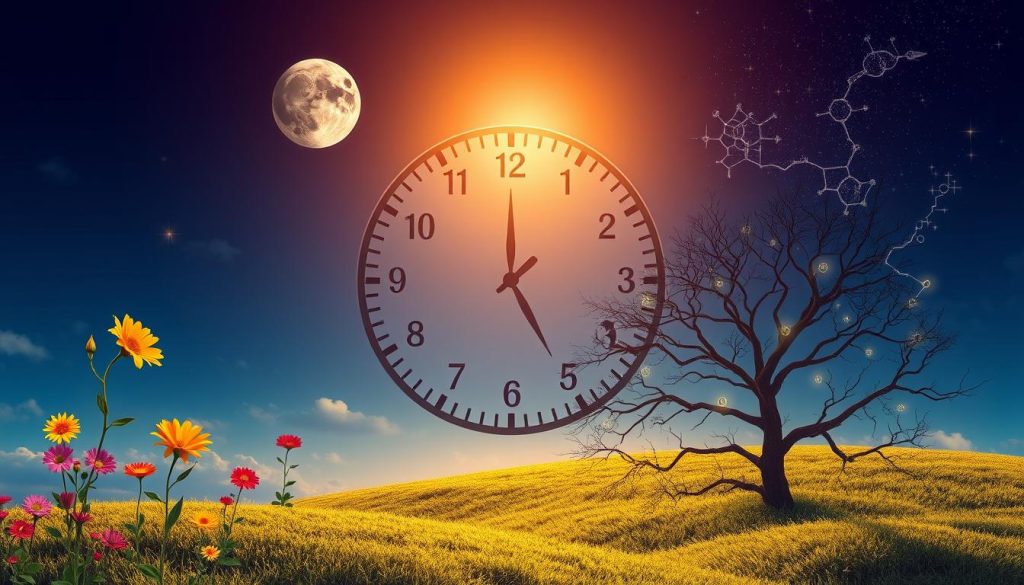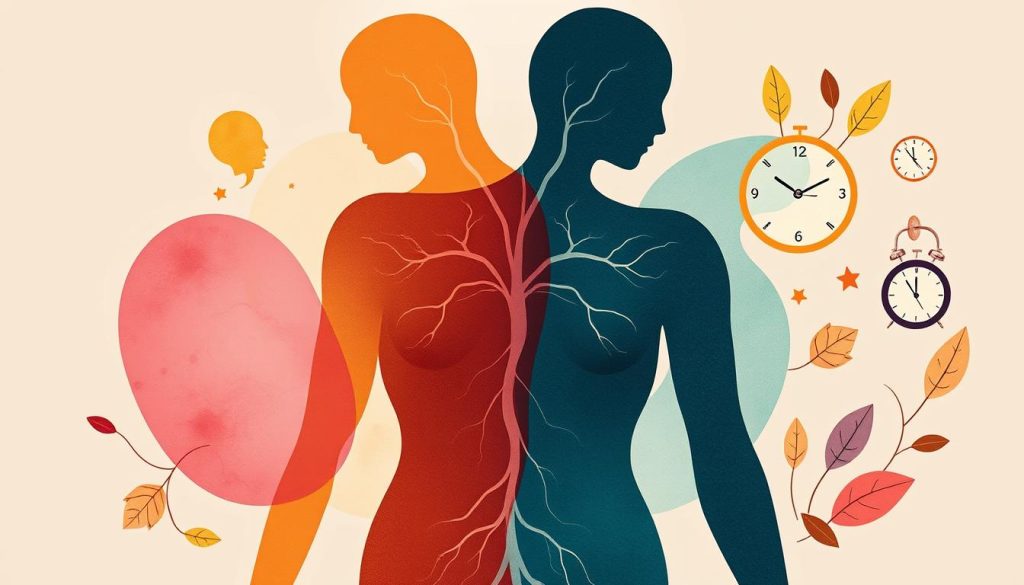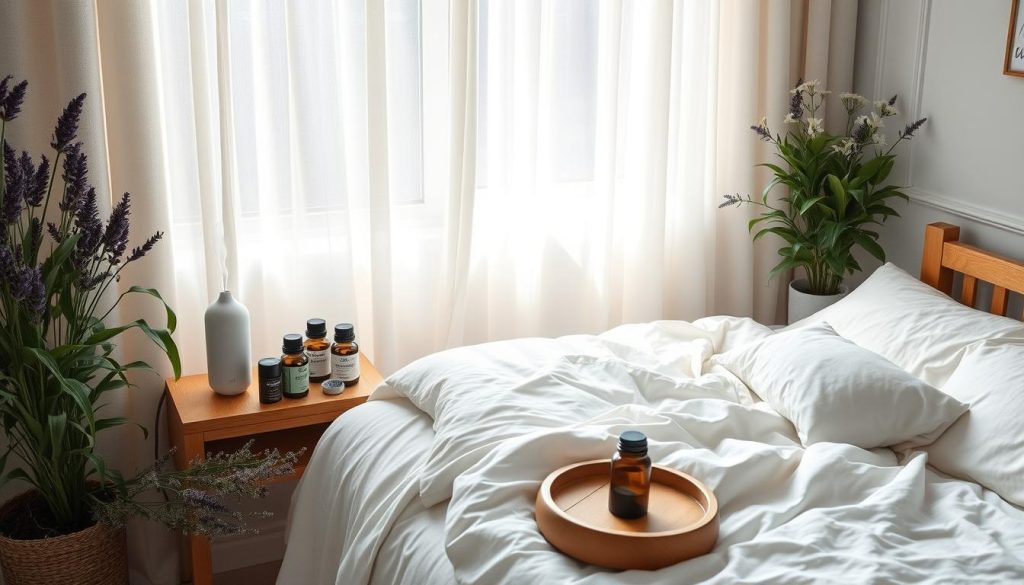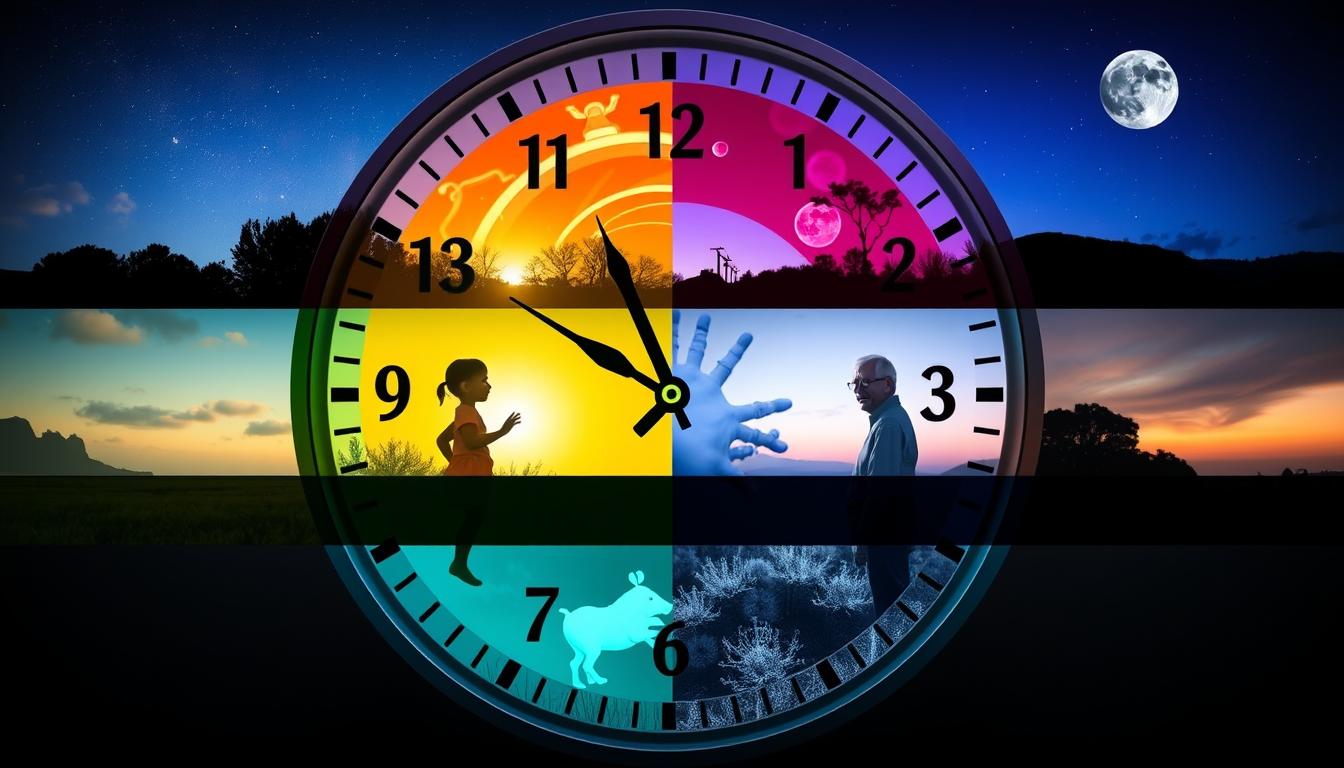As I age, I’ve noticed changes in my sleep and daily routines. It’s important to understand these changes because they affect my sleep and health. Recognizing these shifts helps me live better and stay healthy.
I’ll dive into how sleep changes with age, what affects it, and how to handle any issues. This knowledge is key to managing my daily life and health.
Understanding Circadian Rhythms
Circadian rhythms are like my internal clock, controlling my sleep and daily activities. They affect my mood and energy levels. Knowing how they work helps me stay healthy and feel better.
Definition and Importance
Circadian rhythms are natural cycles that last about 24 hours. They control my sleep, hormone levels, and how I feel. Problems with these rhythms can cause sleep issues, mood swings, and metabolic problems. Staying in sync with my body clock improves my health and performance.
The Role of Melatonin
Melatonin is a hormone that helps me sleep. It tells my body when it’s time to rest. Melatonin levels go up in the evening and peak at night, helping me sleep well. As I get older, my melatonin levels may drop, affecting my sleep. Knowing how melatonin works with my rhythms helps me sleep better.

| Aspect | Circadian Rhythms | Melatonin Function |
|---|---|---|
| Definition | Biological 24-hour cycles | Hormone regulating sleep |
| Primary Influence | Sleep-wake pattern | Signals sleepiness |
| Peak Levels | Nighttime | Evening to night |
| Impact of Aging | Possible disruption | Decreased production |
Circadian Rhythm Changes with Age
As I get older, my sleep patterns change a lot. This shows how aging affects sleep, making us go to bed and wake up earlier. Older adults often have trouble sleeping, leading to feeling tired all the time. Knowing about these changes helps me deal with them and stay healthy.
How Sleep Patterns Shift
My body changes with age, affecting my sleep. Here’s how sleep patterns change over time:
- I go to bed earlier in the evening.
- I wake up earlier in the morning.
- My sleep is often broken, making me feel tired.
- I find myself napping more during the day, but it worries me.
Impact on Overall Health
Changes in sleep can harm our health. Poor sleep can lead to:
- Obesity because of how sleep affects our metabolism.
- Higher chances of diabetes, as sleep impacts insulin.
- Increased risk of heart disease from inflammation and stress.
I understand the need to pay attention to these sleep changes. While they’re part of aging, their health effects are important.
Factors Influencing Circadian Rhythms in Older Adults
As I age, many factors affect my circadian rhythms. Understanding these helps me keep a healthy sleep pattern. Hormonal changes and health conditions and medications are key areas to focus on.
Hormonal Changes
Hormonal changes in aging impact my sleep a lot. For example, older adults often make less melatonin, which helps us sleep. Hormonal imbalances, especially during menopause, can also mess with my sleep cycles. These changes make it hard to fall or stay asleep.
Health Conditions and Medications
Many health conditions affect my circadian rhythms. Sleep disorders like insomnia are especially tough and can make sleep quality poor. Mental health issues like depression or anxiety also make it hard to sleep well. Plus, some medications can either help or hurt my sleep. It’s important for me to watch these closely to improve my health.

Managing Circadian Rhythm Disruptions
Changes in my sleep patterns need my attention to get back in sync. I practice good sleep hygiene and try natural remedies. These steps help improve my sleep and overall health.
Sleep Hygiene Practices
Good sleep hygiene is key to managing my circadian rhythm. I follow these practices:
- I stick to a regular sleep schedule, going to bed and waking up at the same time.
- I make my sleep space comfy by adjusting the room’s temperature, reducing noise, and using curtains to block light.
- I cut down on caffeine and avoid screens for at least an hour before bedtime.
Natural Remedies and Supplements
I explore natural sleep aids to enhance my sleep. Here are some options I consider:
- Melatonin: This hormone helps control my sleep-wake cycle and can adjust my circadian rhythm.
- Valerian root: It’s known for its calming effects, which might help me relax and sleep better.
- Chamomile: This herbal tea is a gentle way to help me relax before bed.

The Importance of Routine
Creating a daily sleep routine is key as I get older. It keeps my body’s internal clock in sync. This leads to better sleep and more energy during the day.
Sticking to a schedule helps my body know when to relax. This boosts my overall health and happiness.
Regular routines in the morning and evening improve my sleep. Eating at set times also helps keep my energy steady. This makes it easier to tackle daily tasks without feeling tired.
As I age, focusing on self-care is crucial. Tailoring my activities to fit my needs improves my sleep and life quality. A balanced routine leads to a healthier, happier life.

